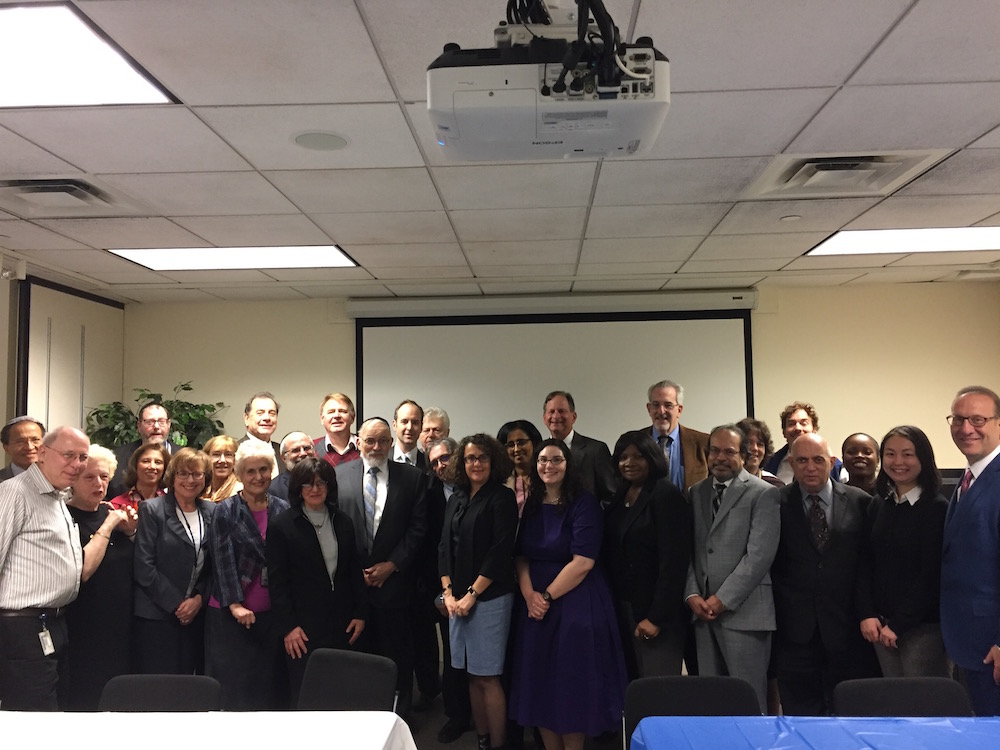“More Crucial Than Ever”
Touro Authors Celebrate at Annual Luncheon

While the internet has disrupted the traditional publishing and academic landscape, one thing remains constant: Touro faculty members are publishing more than ever.
Faculty members celebrated their accomplishments on November 16 at the sixth annual Author Appreciation Luncheon held in Touro’s midtown headquarters. Staff members from Touro’s New York schools congregated and enjoyed a presentation about the changing publishing landscape. Each faculty member was given a book listing the articles and books written by Touro professors, with more than 1170 citations from almost 600 authors.
“Information is the currency of our democracy,” stated Bashe Simon, director of Touro’s Libraries as she opened the event. “The dissemination of literature and knowledge has been the keystone of Touro.”
Touro College and University System President Dr. Alan Kadish spoke about his own time as a faculty member at Northwestern University. “Historically the library has been the area of Touro that has functioned as the repository of scholarly and academic activity,” Dr. Kadish said.
From his own experiences, Dr. Kadish segued into a discussion of the new landscape of academia and public information.
“Writing in 2017 has taken on a different meaning than it has historically,” explained Dr. Kadish. “Followers on Twitter and Facebook ‘likes’ are now considered more important than producing something peer-reviewed and something of value. Filtering information and trying to understand what’s accurate and what’s not has become a challenge.”
“We’re in the midst of a significant paradigm shift,” continued Dr. Kadish. “It is more crucial than ever to subject what we write to critical review and analysis. At the same time, we must reach the largest possible audience while maintaining our academic integrity.”
Patricia Salkin, Touro College Provost for the Graduate and Professional Divisions and a professor at the Touro Law Center, encouraged the authors and researchers to collaborate and to take advantage of the help Touro provides its faculty and students, including the recently launched presidential grants LINK and faculty awards. “Come forward so we can aid you in your scholarly pursuit,” she explained.
Dr. Salomon Amar, Touro’s newly appointed Provost for Biomedical Research and Chief Biomedical Research Officer, spoke about his own work that received funding from NIH. Noting that the book of published works had increased since last year, Dr. Amar joked that the book “had an obesity problem” but fortunately some faculty members were already researching that.
Ann Nowak, a professor at the Touro Law Center and the director of the school’s writing center, spoke about her own journey towards becoming a researcher during her keynote speech. One day in her class, she noticed students were having trouble reading from the board. After consulting a reading specialist, Nowak launched a study examining the reading abilities of her students. She received a presidential grant for her research and is currently at work on her study, “Disfluency as an Indicator of Hidden Reading Comprehension Difficulties Among Students in Higher Education.”
“If it’s happening to our law students, it’s happening everywhere,” Nowak said.
As the faculty members congregated for lunch, several authors spoke about the satisfaction they derived from meeting other authors.
“I really enjoyed the opportunities to get together with other authors,” said TCOP professor Ellen Loh, whose paper, “Proximal predictors of long-term discontinuance with noninsulin antihyperglycemic agents,” was published in Journal of Managed Care and Specialty Pharmacy.
Lander College of Arts and Sciences Dean Henry Abramson, whose book, Torah From the Years of Wrath 1939-1943: The Historical Context of the Aish Kodesh, debuted to acclaim said that he appreciated the event.
“Scholarship is often a very lonely solitary task and to have a moment to celebrate with others and to realize we exist in a community of scholars is very valuable,” he said.
/prod01/channel_38/media/redesign/assets/images/background-images/locations-background.jpg)
